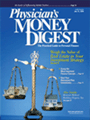AMT Ignorance Doesn't Lead to Tax Bliss
Answer:
Forewarning:
What's stealthy, insidious, andaffects physician-investors nationwide? the federalalternative minimum tax (AMT).While much has been written about theAMT, it's important that physicians andtheir advisors understand what it represents.That's because an increasing numberof Americans are falling into itssomewhat avoidable trap. Since the AMT is a complicated tax,we're going to focus on the basics.
Unplanned Consequences
Originally, the AMT was supposed toensure that the very wealthy didn't avoidpaying income taxes by using certainallowable deductions and tax preferences.However, because of the impactof inflation and tax law changes, manyphysicians who don't consider themselveswealthy and don't have special taxpreferences are now responsible for payingthe AMT. And in many cases, thesephysicians aren't even aware that theyhave this liability.
Basically, if your taxable income is overthe specified exemption amount for regulartax purposes, then you will have to paythe AMT. The Sales and Growth Tax ReliefReconciliation Act of 2003 increased theexemption amounts to $40,250 for unmarriedindividuals and $58,000 for marriedcouples. But a phase-out of thisexemption exists based on AMT income,fully eliminating the exemption once AMTincome reaches $382,000 if married andfiling jointly, or $273,500 if single or thehead of the household.
Liability Concerns
The AMT may be triggered by varioustypes of deductions, types of income,and certain tax credits allowable for regulartax purposes, but not for the AMT.One physician couple became subject tothe AMT when their income from investmentscaused an increase in their stateand local taxes. Unfortunately, this is afairly common situation today—a trapnot envisioned by the original creators ofthe AMT. Following is a list of some ofthe common items that increase yourchances of being liable for the AMT:
- Miscellaneous itemized deductions such as employee business expenses
- Personal exemptions for you and your dependents
- State and local income taxes
- Real estate taxes
- Otherwise tax-exempt interest on certain municipal bonds used to financeprivate activities
- Participating in the exercise of incentive stock options
- Interest on personal residence debt where the proceeds are not used toacquire, construct, or substantially improve the residence
It's sometimes possible to reduce oreliminate the impact of the AMT. Toaccomplish this, it's necessary to sufficiently prepare projections of your taxconfiguration for the current year—andoften for the next year—before year-endso that appropriate action can be taken.Note: One of the obstacles to changingthe AMT situation is the federal budgetdeficit. The AMT currently brings in substantialtax revenues. If no changes aremade, AMT revenues will continue togrow over future years.
Robert E. Harrison, CPA, JD, ispartner and cochairman of EisnerLLP's Tax Advisory ServicesGroup. Headquartered in NewYork City with offices in NewJersey and Long Island, Eisnerprovides auditing, accounting, and tax services,as well as corporate finance, information technology,and other professional services to a broadrange of clients. Eisner serves companies throughoutNorth America and is an independent memberof Baker Tilly International.
